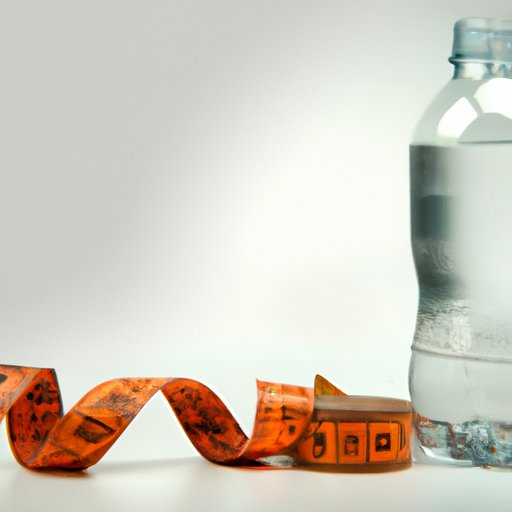
I. Introduction
Have you ever wondered if drinking more water can aid in your weight loss journey? The answer is yes – staying hydrated can help shed those pounds off. In this article, we will cover the science behind how water intake affects weight loss, the recommended daily water intake, benefits of increased water intake, and some effective tips for drinking more water throughout your day.
A. Definition of the problem
Obesity is a growing problem worldwide, with more and more people struggling to maintain a healthy weight. Weight loss can be challenging, and there are various methods, diets, and drinks available in the market to help. However, combined with healthy habits and exercise, drinking enough water can significantly contribute to achieving your weight loss and fitness goals.
B. Importance of the issue
Obesity is not just a physical problem. It can lead to several other health issues like diabetes, heart diseases, and stroke. Drinking the recommended amount of water daily can help maintain good health and aid in weight loss, making it vital for individuals struggling with obesity and overweight to know about the benefits of hydration.
C. Thesis statement
Drinking more water can help you lose weight, improve your overall health, and aid in maintaining a healthy weight.
II. The Science Behind Water Weight Loss: How Staying Hydrated Can Help Shed Pounds
The first step in understanding the benefits of water for weight loss is understanding how it affects your body.
A. Explanation of how water intake affects weight loss
Drinking water helps to keep the body hydrated, which supports the body’s functions and overall metabolism. When the body is dehydrated, it slows down the metabolism to conserve water. This, in turn, reduces the rate of calories burning, making it harder for your body to lose weight. Drinking enough water ensures that the body’s metabolism stays high, contributing to successful weight loss.
B. Dehydration’s effect on weight loss
Dehydration can hinder your weight loss journey. When dehydrated, the body retains water, causing bloating and water weight. This water retention can mislead individuals to think they’ve gained weight, discouraging them from continuing their weight loss journey. Additionally, since dehydration slows down the metabolism, it becomes more challenging for the body to burn calories, preventing individuals from shedding pounds effectively.
III. Drink Up: How Increasing Your Water Intake Can Boost Your Weight Loss Goals
A. The recommended daily water intake
The Institute of Medicine recommends that men should drink at least 3.7 liters (around 125 ounces) of water per day, while women should drink at least 2.7 liters (91 ounces) per day. However, these recommendations may vary depending on other factors, including activity levels, weather, or medical conditions. It’s best to consult with a healthcare provider to determine the daily water intake suitable for your unique body and needs.
B. Benefits of increased water intake
Increased water intake leads to several health benefits, including aiding in weight loss. Drinking enough water helps to flush toxins from the body and promote healthy digestion of food, making it easier for you to lose weight. It also improves complexion, prevents headaches, strengthens the immune system, and supports overall health.
C. Tips for drinking more water
If you’re struggling to drink the recommended amount of water daily, here are some practical tips to incorporate more water into your routine:
- Carry a water bottle around: This can serve as a reminder to drink water throughout the day.
- Set reminders on your phone: Set timely reminders at intervals to drink water.
- Infuse your water with flavor: Add fruits like lemon or mint to your water to make it more palatable and enjoyable to drink.
- Eat water-rich foods: Include foods with high water content such as watermelon and cucumbers to supplement your water intake.
IV. Why Water is the Secret Weapon for Successful Weight Loss
A. Comparison of water and other weight loss drinks
Water is the ideal weight loss drink. Unlike other sugar-laden drinks like soda, energy drinks, and juices, drinking water does not add calories to your diet. Furthermore, water is a natural thirst quencher, unlike caffeine or sugary beverages. These drinks can actually dehydrate the body.
B. The role of water in metabolism
As previously mentioned, staying hydrated keeps the metabolism high, aiding in successful weight loss. Drinking water can also help burn stored fat by increasing metabolic rate, leading to an increase in energy and weight loss potential.
C. Water as a natural appetite suppressant
Drinking water before meals can help you feel fuller, resulting in a decrease in overall daily caloric intake. In a study, overweight participants who drank water before a meal lost 44% more weight over a 12-week period than those who did not drink water before meals. Drinking water even resulted in reduced hunger and appetite, which can cause automatic weight loss without additional efforts.
V. Flush Out Fat: How Water Can Aid in Your Weight Loss Journey
A. Water as a detoxifying agent
Water helps flush toxins and waste material from the body, promoting healthy digestion and absorption of nutrients, leaving you feeling fuller and less likely to overeat. Furthermore, staying hydrated helps your liver better break down fat, making it easier for you to shed those extra pounds.
B. Reduction of water retention in tissues
Drinking water helps reduce water retention in tissues, reducing overall body weight and increasing weight loss potential. Water retention occurs when the body holds onto excess water, causing bloating and swelling in the body’s tissues. Staying hydrated helps flush out the excess water, reducing bloating, and promoting successful weight loss results.
C. Effectiveness of water in reducing bloating
Drinking more water can help you reduce bloating. Dehydration leads to water retention, which causes bloating. Drinking more water in a day can help reduce water retention and bloating, reducing overall body weight.
VI. Water: The Natural Weight Loss Drink Everyone Needs to Know About
A. Cost-effectiveness of water
Unlike other drinks marketed as weight loss drinks, water is free. Opting to drink water over high-energy drinks can be a cost-effective way to maintain a healthy weight and save money in the long run.
B. Availability/accessibility of water
Water is readily available and accessible, making it easier to incorporate into your daily routine than other weight loss drinks or diets. Water is also available in multiple forms such as bottled, tap, and flavored, giving you various options to choose from.
C. Versatility of water
The versatility of water makes it a great addition to any weight loss plan. You can drink it at any time of the day, with any meal, or even shortly after a workout. Additionally, using water to replace high-calorie drinks in your diet is a versatile approach to weight loss.
VII. Wet Your Appetite: How Drinking More Water Can Reduce Hunger and Boost Metabolism
A. Explanation of the hunger mechanism
Leptin, a hormone that signals fullness, helps regulate hunger. Drinking water helps increase the production of leptin, regulating appetite and leading to effective weight loss.
B. Water’s role in reducing hunger pangs
Drinking water before meals not only helps you feel fuller but also reduces the chances of overeating. Ensuring your body is hydrated can help reduce hunger pangs and keep cravings at bay.
C. Increased metabolism resulting from hydration
Drinking water increases your metabolism, which can lead to effective weight loss. Water does not contain any calories, so it is a calorie-free method of increasing your metabolic rate, making it an ideal choice. Drinking cold water can be especially effective as it forces the body to burn calories to warm the water to body temperature.

VIII. Hydration and Healthy Habits: How Drinking Water can Help You Reach Your Weight Loss Goals
A. Incorporating water into lifestyle choices
Incorporating water into your daily lifestyle choices such as swapping high-sugar beverages for water can help you maintain healthy weight goals. Drinking water with meals, carrying a water bottle wherever you go, and setting reminders on your phone can all help you ensure you stay hydrated and increase your metabolic rate.
B. Best practices for drinking water for weight loss and overall health
- Drink at least 8 glasses of water a day
- Drink water first thing in the morning to hydrate after a night’s sleep
- Drink water before meals to reduce hunger pangs and control your overall caloric intake
- Drink cold water to boost your metabolism
- Keep a water bottle nearby to drink throughout the day
C. Conclusion and practical applications
Ensuring that you drink enough water daily can help you reach your weight loss goals. Drinking water can flush out fat, reduce bloating, regulate appetite, and increase the metabolic rate. Water is cost-effective, versatile, and widely available, making it an ideal weight loss beverage. Incorporating healthy hydration habits, such as drinking more water, into your daily routine, can lead to significant weight loss benefits and overall health goals.
IX. Conclusion
A. Restate thesis
Drinking more water can help you lose weight, improve your overall health, and aid in maintaining a healthy weight.
B. Recap of main points
We’ve covered how water affects weight loss, the recommended daily water intake, the benefits of increased water intake, tips for drinking more water, and the comparison of water to other weight loss drinks. We’ve also covered why water is a secret weapon for successful weight loss and how drinking enough water can aid in your weight loss journey by flushing out fat, reducing bloating, and suppressing appetite.
C. Call to action/ closing remark
Begin incorporating more water into your daily routine to aid in your weight loss journey and overall health goals. Remember to keep in mind the recommended daily intake, tips for drinking more water, and how water can help reduce hunger pangs, boost metabolism, and help with digestion.




